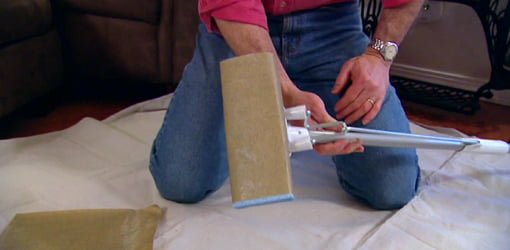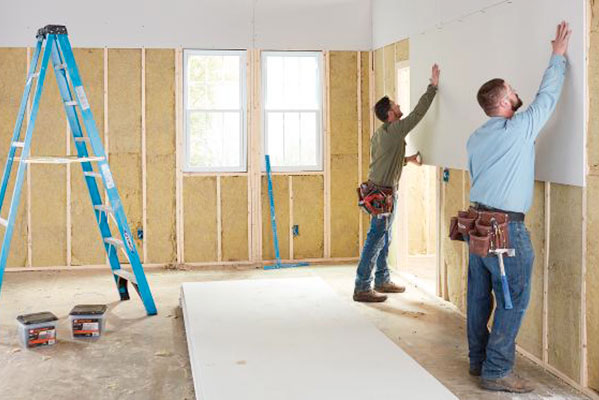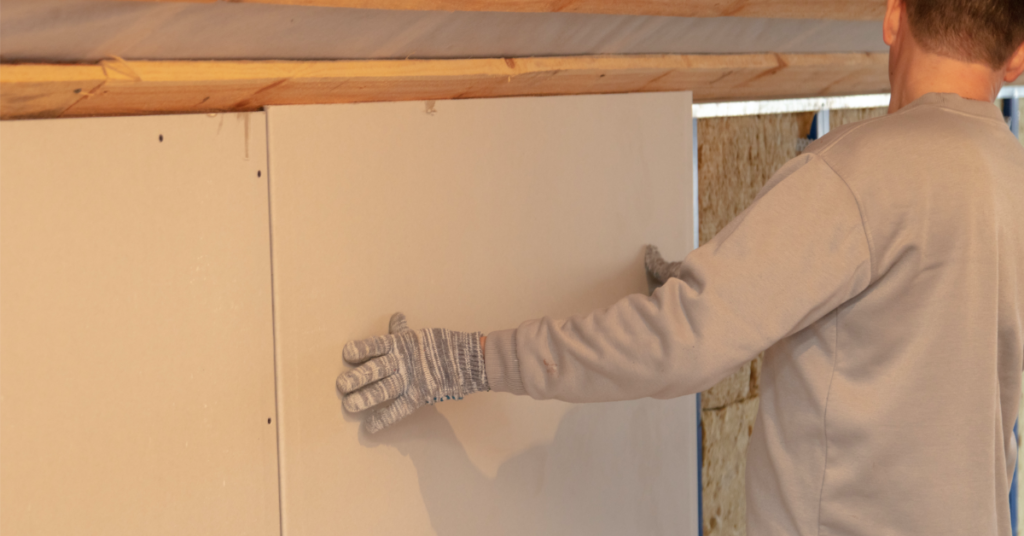
Whether you're hanging drywall for the first time or have had it done many times, there are a few tips to help you. It will be easier to use the right materials and techniques. The walls will be strong and clean. A personal assistant can also be useful.
You want all corners to be perfectly aligned when you hang drywall. This will prevent cracks from forming on the edges of your sheets. This is done by cutting the sheet so it's a quarter inch shorter that the wall. Then you will score the sheet using your utility knife. Finally, use a square to mark the edges with a dry drywall marker.
While hanging drywall is one the most difficult tasks to do, it is not impossible. You can hire someone to help you if you are not confident doing the job. It will save you time and money, but you'll also be able to save money.

Drywall is commonly used as the outer layer of a room. It's strong and easy to use. Typically, you'll find a variety of sizes and thicknesses for a given application. For instance, curved arches may require a sheet with a thinner thickness than standard. The drywall used for ceilings should be longer than the sheet used for walls.
To lift the drywall boards, make sure you have a jack ready before you begin your project. You can rent a crane from most departmental stores. Once you have the lift, it is time to raise the drywall above the ceiling.
You may have to take out drywall boards depending on the shape of your ceiling. In this instance, you'll need re-measure your ceiling joists to mark the new dimensions. Once you have taken the measurements you will need to attach the boards. There are three possible ways to secure the boards.
One method is to create a metal-stud frame. This can take some time. Another option is to install the drywall horizontally. This method gives your walls the greatest surface area and provides a stable base for them to stand on. However, if you work in a restricted space, you need to be careful about how much support is provided. Too much support can create a negative pressure point, which can cause the outer edges of your drywall to warp.

Make sure your drywall is perpendicular your joists, rafters. A few inches of spacing between the rafters and the joists is a good idea. Install a screw in each joist every 12inches to secure the drywall.
To give your walls a professional appearance, add a furing line along the edge. This will keep fasteners in place. You can also use a corner beam. These two methods will guarantee that your drywall is level.
Next, you'll need to hang a row of drywall panels. It is best to put the top row of drywall first. Then, the bottom row. To increase the strength of your walls, you'll need to stagger your joints. Finally, secure the rows using nails or screws.
FAQ
How long does it take for a home to be renovated?
It all depends upon the size of your project and how much time it takes. The average homeowner spends between three to six hours per week on the project.
How much does it set you back to renovate your house?
Renovations typically cost anywhere from $5,000 to $50,000. Renovations are typically a major expense for homeowners, with most spending between $10,000 and $20,000
Are permits necessary to renovate my property?
Yes. Before you start any home improvements project, permits are necessary. A building permit and plumbing permit are required in most cases. You might also require a zoning permission depending on which type of construction is being undertaken.
What Does it Cost to Renovate Your House?
The cost of renovations depends on what material is used, the size of project and how complicated the job is. Some materials, like wood, need special tools like saws and drilling while others, like steel require no additional tools. The price of renovations depends on whether you hire a contractor to do the job or if you are willing to do the work yourself.
The average home improvement project cost is between $1,000 and $10,000. The cost to hire professionals would be anywhere from $5,000 to $25,000. On the other hand, if you decide to do the entire task yourself then the total cost could reach up to $100,000.
There are many factors that influence the final cost of renovations. The cost of renovation depends on the material used (e.g. You can choose between brick or concrete, and the size of your project as well. These are important considerations to remember when estimating total renovation cost.
Statistics
- It is advisable, however, to have a contingency of 10–20 per cent to allow for the unexpected expenses that can arise when renovating older homes. (realhomes.com)
- According to the National Association of the Remodeling Industry's 2019 remodeling impact report , realtors estimate that homeowners can recover 59% of the cost of a complete kitchen renovation if they sell their home. (bhg.com)
- Design-builders may ask for a down payment of up to 25% or 33% of the job cost, says the NARI. (kiplinger.com)
- A final payment of, say, 5% to 10% will be due when the space is livable and usable (your contract probably will say "substantial completion"). (kiplinger.com)
- They'll usually lend up to 90% of your home's "as-completed" value, but no more than $424,100 in most locales or $636,150 in high-cost areas. (kiplinger.com)
External Links
How To
5 Things You MUST Know Before Starting Your Home Renovation
-
Is this something you really want? If you're planning on embarking on major home improvement projects like renovating your kitchen, bathroom, or building a brand new house, it's certain that you'll need to have some assistance. You might reconsider if you're not confident enough to handle such a huge task on your own. It can take up your time and cost you money. You won't reap the benefits. Hire someone who knows the ropes to help you. You'll be able to save a lot of time and stress while still having a lovely space to call your own.
-
How much should I budget? This is a common question, but it can make renovations more expensive. The reason is because you'll probably find yourself having to pay back most of the costs at the end of the day. So if you've got a budget in mind, stick to it! Otherwise, you could end up paying a fortune without getting anything in return.
-
Do I hire professionals or do I need to DIY? - There's no right or wrong answer here, but we'd recommend hiring professional tradespeople if you can afford them. After all, they'll be able to give you advice on how best to proceed with your project. They'll install your plumbing correctly, provide a warranty, and ensure everything goes according to plan. DIY projects often involve a lot trial and error. You'll learn a lot the hard way. You will also need to deal with the many issues that arise during the process.
-
What are my options? - Don't underestimate what a renovation will cost. Even if you think you can manage it on your own, you might find that you need to borrow money from friends and family just to cover the bills. You should also consider the cost of selling your property if you plan to move soon after the renovations are completed.
-
Where should I begin? There is no right or wrong place to begin when it comes to starting. We recommend that you pick something that you are passionate about. That way, you'll be motivated to keep going, and you'll be less likely to procrastinate. Also, avoid places that are difficult to maintain. If you have to deal with dirt and dust, don't try to redecorate the living room.